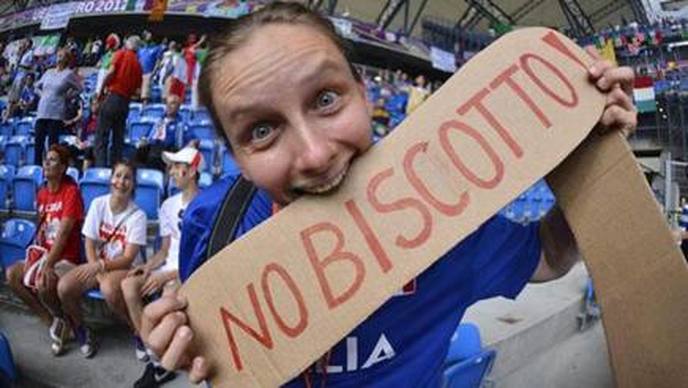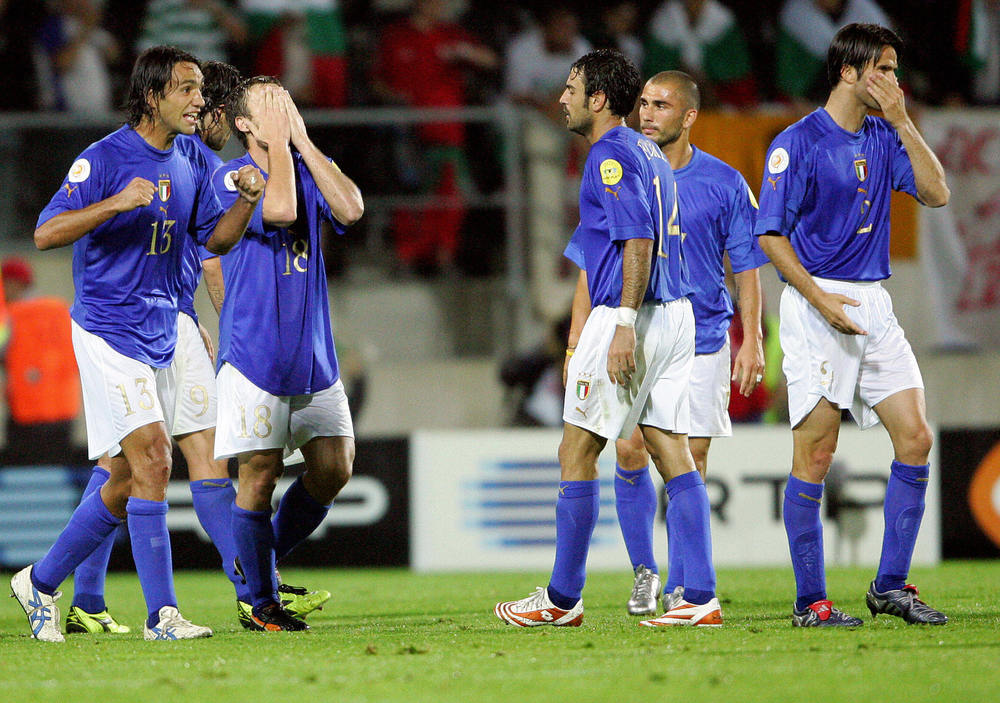It’s June 22, 2004 at the Estádio D. Afonso Henriques in Guimarães, Portugal. Having gone behind shortly before half-time, Italy are drawing 1-1 with Bulgaria in their final group game of Euro 2004. Deep into stoppage time Stefano Fiore feeds the ball out to Massimo Oddo galloping down the right wing, who fires a cross into the penalty area. Andrea Pirlo dummies, allowing the ball to run through his legs to Antonio Cassano who gratefully lashes the ball into the roof of Zdravko Zdravkov’s net. It is the Barese’s second goal of the tournament (and only Italy’s third) and he sprints towards the Italy bench grinning from ear to ear. His smile doesn’t last long however: as he reaches the touchline his teammates explain to him that the other match in the group between Denmark and Sweden has finished 2-2 and Italy are out anyway. Within moments, Cassano is in tears.
In many ways Italy’s elimination at the group stage was justified and entirely explicable. Aside from 60 minutes of impressive attacking football against Sweden, Giovanni Trappatoni’s side had been flat and disjointed, failing to produce anything of note in their first match against Denmark and dropping far too deep in the latter stages of their game against Sweden whilst defending a slender lead. There were widespread rumours of splits in the dressing room, while Francesco Totti had been handed a lengthy ban for spitting at Christian Poulsen during the first match.
In short, the team had not performed anywhere near their potential and were rightly heading home. However, leaving all of this to one side, there were whispers of another explanation for Italy’s elimination and those whispers focused on one word: Biscotto.
As Italy had drawn their first two games, 0-0 and 1-1 respectively, and the Scandinavians had both defeated Bulgaria, going into the final round of fixtures everyone knew that a high scoring draw between Denmark and Sweden (2-2 or more) would allow both sides to advance at the expense of Italy, regardless of the Azzurri’s result in their final match. Italy could win 10-0 and it would make no difference because under UEFA’s rules, where two or more teams finish on the same points, as they did in this case, only the scores in the matches between those sides would be taken into account. The match with Bulgaria would be irrelevant. This created a scenario in which if they could engineer the right result, the Scandinavians could guarantee their passage to the next round come what may. This in Italy is known as a Biscotto.
Biscotto literally means biscuit and like its French/English equivalent, it originates from the latin for cooked twice. The idea is seemingly that you cannot make a biscotto on your own: it requires two parties, hence the double element of the name. Having said that, in Italy the term torta (cake) is also sometimes used and in Spain the same thing is called a pastel, a kind of dessert pastry. Seemingly, such arrangements are always sweet, provided you don’t end up on the wrong end of them of course.
It should be pointed out that there was no evidence whatsoever that Denmark and Sweden did anything to fix the result of the game, this is despite the fact that the Italian media reportedly sent extra cameras to the match to keep an eye out for any suspicious behaviour by the teams. One might legitimately point out that perhaps Italy should have been more concentrated on their own team, which was stuffed with talent and misfired badly. However, to do so would be to fundamentally misunderstand the culture, not just of Italian football, but of the country as a whole.
Any time the possibility of a biscotto presents itself, a certain element of the Italian press and the public becomes completely obsessed with the machinations of any potential plot. This is because the idea of the biscotto speaks to another concept beloved by Italians: dietrologia. Dietrologia, literally ‘behind-ology’, is the idea that there is always a more obscure and intriguing explanation for anything that happens in public life. In the English speaking world, we would recognise dietrologia in conspiracy theories or what Richard J Hofstadter called: The Paranoid Style in American Politics. In Italy, it is seemingly much more widespread.

Read ‘Italy and Euro 2004: A Scandinavian Conspiracy or Pragmatism?
When you look at recent Italian sporting, political and legal history, it is not hard to see why Italians may be more prepared to believe that nothing is what it seems. From Calciopoli to the trials of Silvio Berlusconi and Amanda Knox, major Italian scandals tend to follow a familiar pattern: there is an initial result in the first trial, which is then completely reversed on appeal, then at the second appeal the original result is re-instated and/or the statute of limitations expires.The result is that there is no result: everyone can claim that he/she was vindicated in what he/she thought to begin with, as at least one court has agreed with him/her. On a fundamental level, no one ever expects the truth to come out and on a more banal level the controversy and conspiracies can continue forever because there is no clear outcome.
This is part of the reason that the biscotto narrative can be so compelling: who wants to talk about an Italy side that was plainly exhausted from a long season and led by a coach who, though legendary in his time, was past his best, when the alternative is the intrigue of two neighbours conspiring to do the patria down? Another factor is that football, like life in general, can be confusing and chaotic. Important results can be determined by minor incidents and pure chance has a huge part to play. In the face of this, it can be comforting to believe that someone somewhere is in control of events.
The story came full circle in the Euro 2016 finals. This time Italy were guaranteed top spot in the group having won their first two games and it was Sweden who needed Italy to beat the Republic Of Ireland in order to have a chance of securing third place and passage to the round of 16. Football fans have long memories though, and in the run up to the final game, there was talk of Italy having a conto in sospesa (a score to settle) with the Swedes.
Sure enough in the final game, a heavily changed Azzurri succumbed 1-0 to the Boys in Green who advanced to the next round (Sweden, for their part, lost to Belgium so would have been eliminated in any event). In reality, Antonio Conte, the Italy coach, had every reason to rest players in that match knowing that in all likelihood, they would be playing against Spain in a couple of days and it would be harsh on Ireland to try to take that win away from them.
On the other hand, Gianluigi Buffon, the only survivor from that night in Portugal, was on the bench for Italy and at the final whistle he was straight over to congratulate the Irish team and staff with a beaming smile on his face, something which it’s hard to imagine him doing after even the most insignificant defeats. Of course, we’ll never know for sure what happened, but if this was a biscotto, surely it would have been the sweetest of them all.

